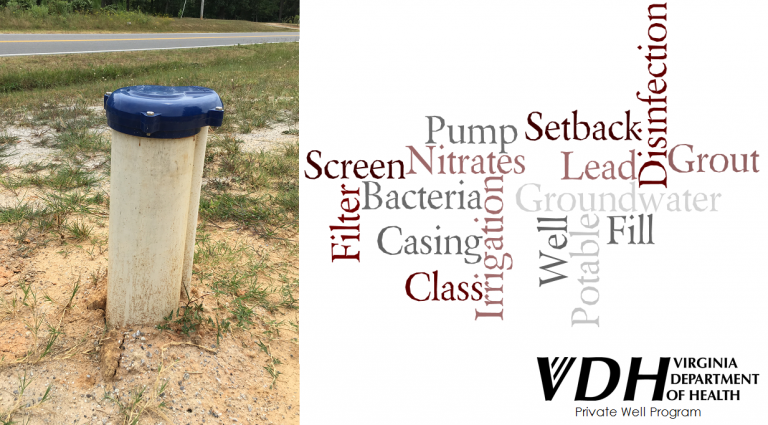Support from the Virginia Household Water Quality Program

By John Bartos, Ph.D. Student; Environmental and Water Resources, Via Department of Civil & Environmental Engineering
Not all Virginia is the urban sprawl of Washington, D.C. or Richmond. The vast majority of the Commonwealth of Virginia is rolling hills of countryside or the plains overlooking Chesapeake Bay or the Atlantic Ocean. Living in the country has its advantages and disadvantages compared to the urban dwelling of city folk. For the countryfolk, water must come from somewhere. Prior to 100 years ago, water came from the local stream, springs, or hand dug wells for this previous resource. After the advent of the motor, wells became more common place for people to get their water from the ground. Having a well is like being your own water department because you are responsible for the maintenance of the well, pump, and all the piping to the faucet in the house. On the flip side, there isn’t a bill going for water to the city water department.
Using wells have many advantages like using the “filtering” power of the Earth itself to remove harmful bacteria and contaminants; however, having problems with the quality of the water is not easily seen by looking at the glass of water coming from the tap. Problems can come from many sources like poor construction of the well or pipes, a neighbor releasing contamination into the groundwater upgradient, or the groundwater is picking harmful metals naturally along its way in the ground itself.
The Commonwealth of Virginia has a program to help the individual that is on well-water or getting water from a nearby spring. The program uses the laboratory at Virginia Tech to provide economical but also confidential testing of the water for 14 different chemical and bacteriological constituents right out of the tap. Along with the analysis, the Virginia Household Water Quality Program through the Virginia Cooperative Extension regularly holds meetings locally in the Commonwealth to explain what the results mean and what options people may consider dealing with any water problems identified from the testing.
The Virginia Household Water Quality Program can be found at the following website: www.wellwater.bse.vt.edu/. Erin Lang is the main contact for the program through Virginia Tech’s Biological Systems Engineering Department. She can be contacted at (540) 231-9058 or at wellwater@vt.edu.


